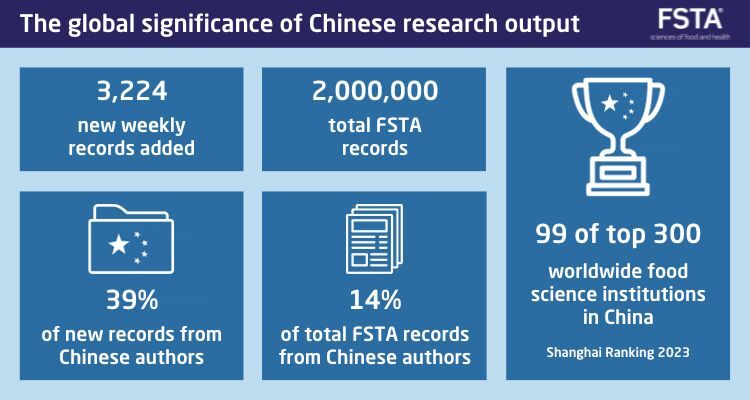As societies grapple with complex challenges related to nutrition, sustainability, and health, the global community's interest in food science and technology has reached unprecedented levels. Researchers worldwide are turning their attention to developing innovative solutions to address pressing issues such as food security, dietary health, and the environmental impact of food production.
The Food Science and Technology Abstracts (FSTA) database stands at the forefront of these trends, providing valuable insight into this evolving landscape. Reflecting the growing international focus on food science, the rate at which new records are added to this digital repository has increased threefold since 2013. Over 146,000 records, including journal articles, standards, and patents, have been indexed so far in 2023.
Accelerating content curation means FSTA recently reached an important milestone, adding the 2 millionth record to the database. This achievement reflects the richness and depth of FSTA data, which has been meticulously curated by IFIS Publishing since its inception in 1968.
Prominent presence of Chinese research
To accelerate scientific advances in food science, health, and nutrition we need to bring together international research, support knowledge sharing, and bridge language barriers. As FSTA celebrated the addition of its 2 millionth record, it underscored a commitment to advancing food science through global collaboration.
On the week when FSTA surpassed the 2 million record mark, 3,224 additional articles were added to the database including research produced by corresponding authors in 88 different countries.
In this diverse research landscape, one country stood out in particular. China-based authors produced 1,255 of the records added to FSTA in that period, meaning that Chinese research output now accounts for a significant 39% of the weekly records added. Around 14% of the 2 million records indexed in FSTA since 1968 originate from China, suggesting the country is accelerating its share of global food science publications.

Importantly, the body of research emerging from the country is growing in impact and influence as well as volume. This substantial representation of Chinese authors in FSTA not only signifies quantity but also quality. IFIS Publishing's meticulous vetting process, conducted by our team of food and data scientists, ensures the exclusion of potential predatory content and junk science. This process underscores the reliability of FSTA as a trusted source of high-quality scientific information.
The rising influence of China in food science finds further validation in the 2023 Shanghai Rankings. In 2022, China accounted for 76 of the top 300 food science institutions, a figure that increased to 99—nearly one-third of the list—this year.
Global implications of China’s research drive
The surge in Chinese research output in the field of food science and technology is not an isolated phenomenon but part of a broader national push towards research dominance across various disciplines.
Initiatives like the "Double First-Class" plan, launched by the Chinese government, emphasize the development of world-class universities and disciplines. This plan has spurred significant investment in research and development, fostering an environment conducive to scientific innovation and exploration.
China's emphasis on science and technology is evident in its consistent rise in global research output. According to data from the National Science Foundation (NSF), China has been the world's largest producer of scientific articles since 2016, surpassing the United States.
As China continues to extend its reach in scientific research, particularly in food science and technology, the global implications are profound. The FSTA database shines a spotlight on these transformative dynamics.
For Chinese subscribers, FSTA access is not merely a conduit to global insights; it is a key enabler in the continuous enhancement of Chinese food science. Simultaneously, it serves as a gateway for international innovators, offering unbridled access to the expansive wealth of information emanating from China, breaking down language barriers and fostering cross-cultural exchange.
In its role as a hub for high-quality international food science, FSTA acts as a catalyst for a new era in global food science through its commitment to collaboration, celebration of diversity, and an unwavering pursuit of knowledge.


